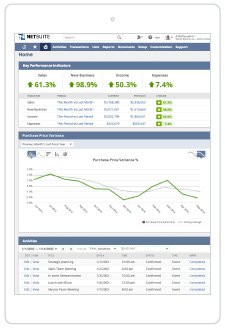CIO
Keep your business moving forward, drive transformation and enable innovation
Lead Your Organization’s Move to the Cloud
Add New IT Capacity and Capabilities, Control Costs and Minimize the Risk of IT Over-Investing or Under-Investing
Today’s CIOs have to be more versatile and more attuned to business strategy. They have to seek out innovative ways to leverage emerging technologies and business models in the value chain to improve business performance and stay competitive.
As an innovative CIO, you know that the debate around on-premise vs. cloud-based applications is over. NetSuite’s cloud based solution is delivered on a SaaS platform enabling you to take advantage of the latest technology, efficiencies and innovations, while saving time and money by shouldering the burden of maintenance and hosting—and ensuring seamless upgrades.

Benefits
CIO the Leader
Redesign your IT organization to meet the needs of the future—a future punctuated by both accelerating and disruptive change.
CIO the Strategist
Build coalitions, persuade peers and collaborate with other executives by delivering transformative business value with limited resources and an optimized infrastructure.
CIO the Steward
Run IT operations without having to worry about infrastructure, security risks and downtime. Maintain an efficient IT organization while keeping pace with growth and competition.
CIO the Catalyst
Increase influence by redefining how you provision computing infrastructure, identify and develop the capability to use new tools and identify and exploit your enterprise’s knowledge resources.
Features
Speed of Deployment
Cloud infrastructure enables deployment of mature, full-featured ERP without additional IT resources.
Globally Enabled
Multi-subsidiary enabled, used in 160+ countries across 190+ currencies.
Limitless Customization and Seamless Upgrades
Tailor the system to your businesses processes without compromising upgrades. Customizations migrate automatically with every upgrade.
Packaged Integration
Prebuilt integration with other legacy systems through respected partners including Informatica, IBM, Cast Iron, and Dell Boomi.
Scalable, Available and Secure
- Deployed by more than 21,000 customers customers, receiving millions of unique logins per month.
- System uptime guarantee of 99.5%.
- SOC 1 Type II and SOC 2 Type II, PCI-DSS, EU-US Privacy Shield, and ISO 27001 certified.
- Uses 256-bit TLS encryption.
Disaster Recovery
Multiple data centres with mirroring and replication.
































